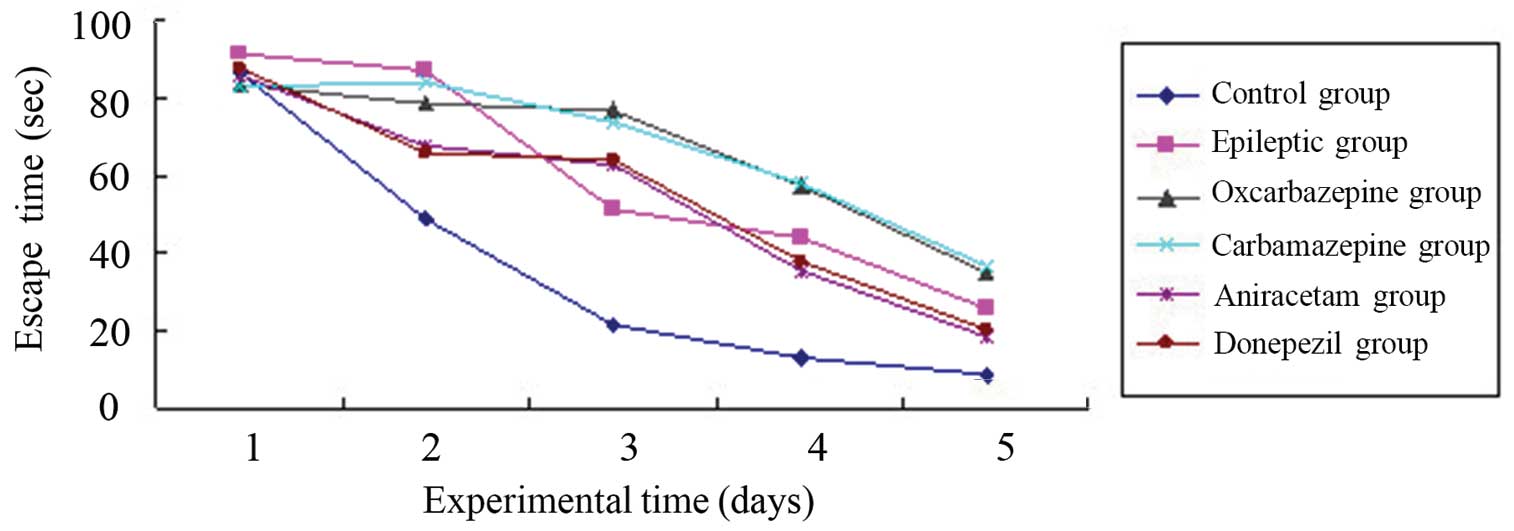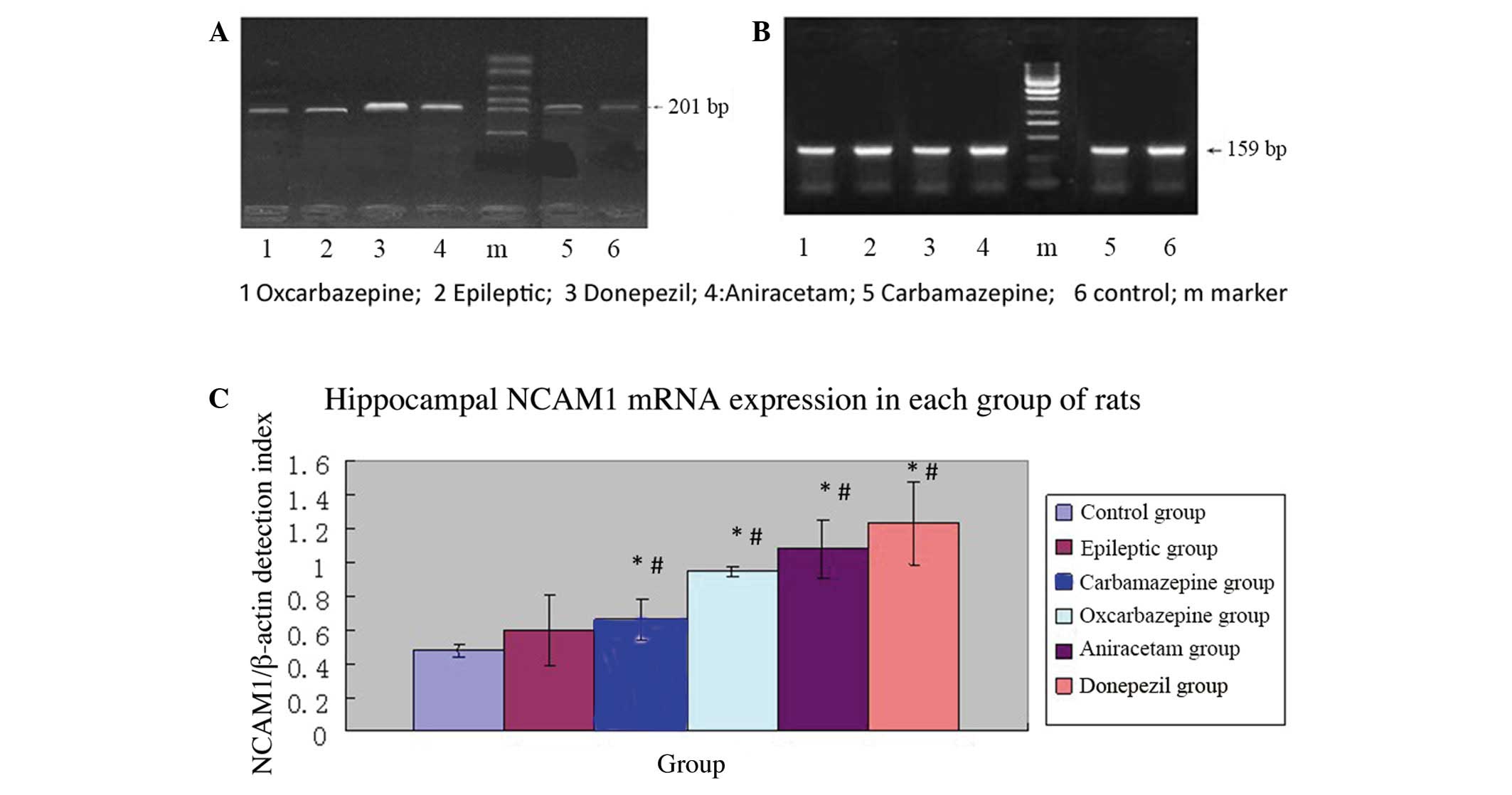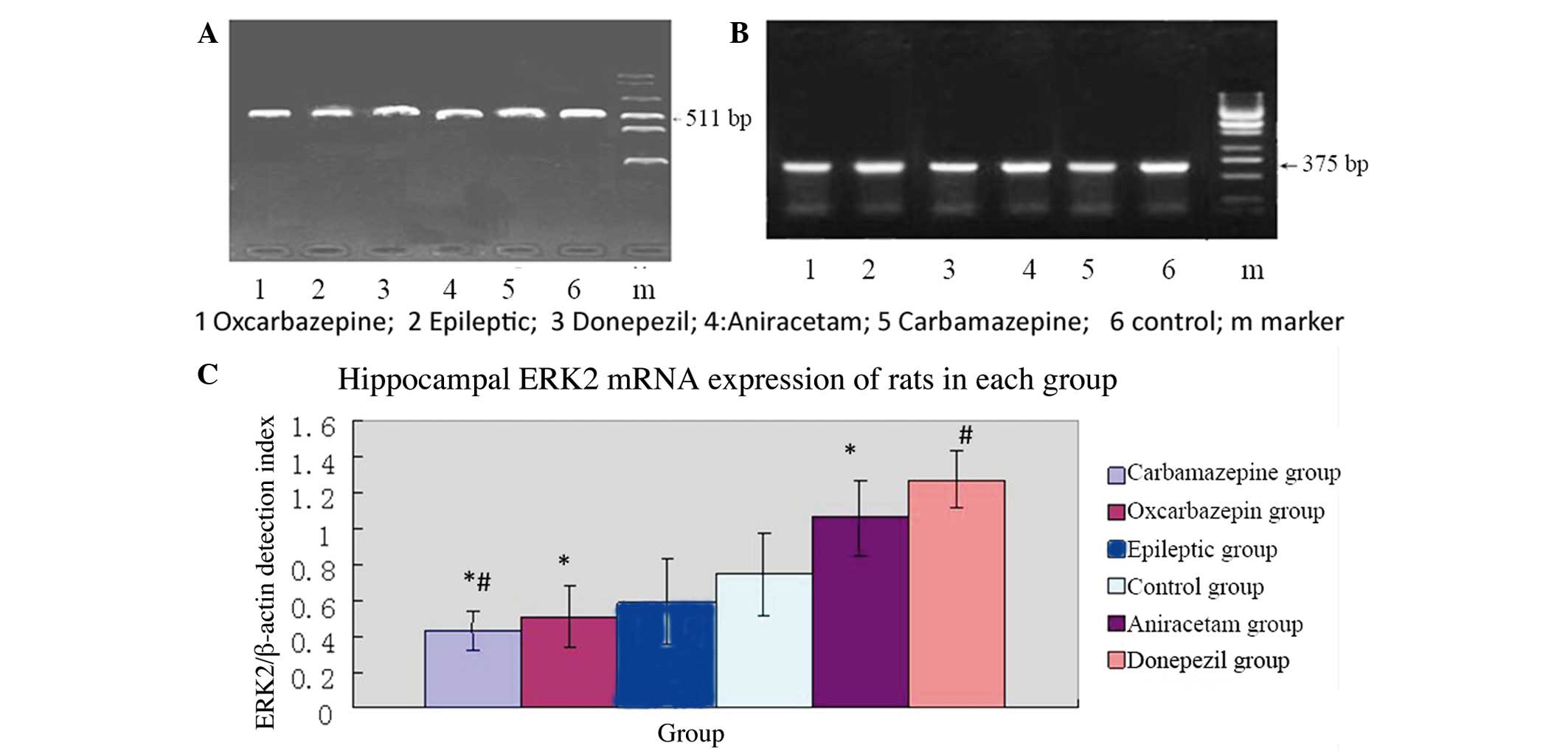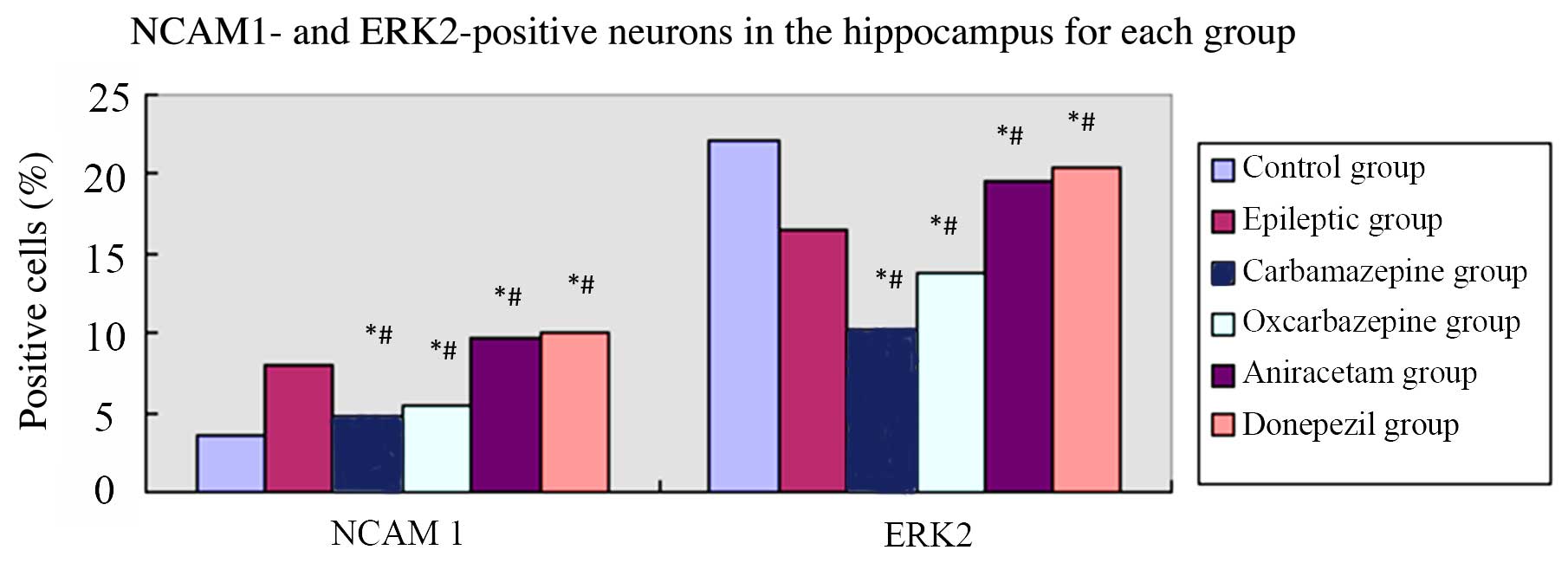|
1
|
Browne TR and Holmes GL: Epilepsy. New
Engl J Med. 344:1145–1151. 2001. View Article : Google Scholar : PubMed/NCBI
|
|
2
|
Chang BS and Lowenstein DH: Epilepsy. New
Engl J Med. 349:1257–1266. 2003. View Article : Google Scholar : PubMed/NCBI
|
|
3
|
Scharfman HE: The neurobiology of
epilepsy. Curr Neurol Neurosci Rep. 7:348–354. 2007. View Article : Google Scholar : PubMed/NCBI
|
|
4
|
Hermann B and Seidenberg M: Epilepsy and
cognition. Epilepsy Curr. 7:1–6. 2007. View Article : Google Scholar : PubMed/NCBI
|
|
5
|
Zhou JL, Shatskikh TN, Liu X and Holmes
GL: Impaired single cell firing and long-term potentiation
parallels memory impairment following recurrent seizures. Eur J
Neurosci. 25:3667–3677. 2007. View Article : Google Scholar : PubMed/NCBI
|
|
6
|
Liu X, Muller RU, Huang LT, Kubie JL,
Rotenberg A, Rivard B, Cilio MR and Holmes GL: Seizure-induced
changes in place cell physiology: Relationship to spatial memory. J
Neurosci. 23:11505–11515. 2003.PubMed/NCBI
|
|
7
|
Parent JM, Tada E, Fike JR and Lowenstein
DH: Inhibition of dentate granule cell neurogenesis with brain
irradiation does not prevent seizure-induced mossy fiber synaptic
reorganization in the rat. J Neurosci. 19:4508–4519.
1999.PubMed/NCBI
|
|
8
|
Rutten A, van Albada M, Silveira DC, Cha
BH, Liu X, Hu YN, Cilio MR and Holmes GL: Memory impairment
following status epilepticus in immature rats: Time-course and
environmental effects. Eur J Neurosci. 16:501–513. 2002. View Article : Google Scholar : PubMed/NCBI
|
|
9
|
Doherty P, Fazeli MS and Walsh FS: The
neural cell adhesion molecule and synaptic plasticity. J Neurobiol.
26:437–446. 1995. View Article : Google Scholar : PubMed/NCBI
|
|
10
|
Li J, Dai G, Cheng YB, Qi X and Geng MY:
Polysialylation promotes neural cell adhesion molecule-mediated
cell migration in an fibroblast growth factor receptor-dependent
manner, but independent of adhesion capability. Glycobiology.
21:1010–1018. 2011. View Article : Google Scholar : PubMed/NCBI
|
|
11
|
Wu GY, Deisseroth K and Tsien RW: Spaced
stimuli stabilize MAPK pathway activation and its effects on
dendritic morphology. Nat Neurosci. 4:151–158. 2001. View Article : Google Scholar : PubMed/NCBI
|
|
12
|
Kiss JZ and Muller D: Contribution of the
neural cell adhesion molecule to neuronal and synaptic plasticity.
Rev Neurosci. 12:297–310. 2001. View Article : Google Scholar : PubMed/NCBI
|
|
13
|
Seidenfaden R, Krautzer A and Hildebrandt
H: The neural cell adhesion molecule NCAM regulates neurogenesis by
multiple mechanisms of interaction. Neurochem Int. 49:1–11. 2006.
View Article : Google Scholar : PubMed/NCBI
|
|
14
|
Niquet J, Jorquera I, Ben-An Y and Represa
A: NCAM immunoreactivity on mossy fibers and reactive astrocytes in
the hippocampus of epileptic rats. Brain Res. 626:106–116. 1993.
View Article : Google Scholar : PubMed/NCBI
|
|
15
|
Parent JM, Yu TW, Leibowitz RT, Geschwind
DH, Sloviter RS and Lowenstein DH: Dentate granule cell
neurogenesis is increased by seizures and contributes to aberrant
network reorganization in the adult rat hippocampus. J Neurosci.
17:3727–3738. 1997.PubMed/NCBI
|
|
16
|
Zhao W, Bianchi R, Wang M and Wong RK:
Extracellular signal-regulated kinase 1/2 is required for the
induction of group I metabotropic glutamate receptor-mediated
epileptiform discharges. J Neurosci. 24:76–84. 2004. View Article : Google Scholar : PubMed/NCBI
|
|
17
|
Fukunaga K and Miyamoto E: Role of MAP
kinase in neurons. Mol Neurobiol. 16:79–95. 1998. View Article : Google Scholar : PubMed/NCBI
|
|
18
|
Xi ZQ, Wang XF, He RQ, Li MW, Liu XZ, Wang
LY, Zhu X, Xiao F, Sun JJ, Li JM, et al: Extracellular
signal-regulated protein kinase in human intractable epilepsy. Eur
J Neurol. 14:865–872. 2007. View Article : Google Scholar : PubMed/NCBI
|
|
19
|
Houser CR, Huang CS and Peng Z: Dynamic
seizure-related changes in extracellular signal-related kinase
activation in a mouse model of temporal lobe epilepsy.
Neuroscience. 156:222–237. 2008. View Article : Google Scholar : PubMed/NCBI
|
|
20
|
Mariggiò MA, Morabito C, Guarnieri S,
Gentile A, Kolkova K and Fanò G: IgIII (270-280)-fragment-like
H2N-DDSDEEN-COOH peptide modulates N-CAM expression via
Ca2+-dependent ERK signaling during ‘in vitro
neurogenesis’. Peptides. 29:1486–1497. 2008. View Article : Google Scholar : PubMed/NCBI
|
|
21
|
Rowles J and Olsen M: Perspectives on the
development of antioxidant antiepileptogenic agents. Mini Rev Med
Chem. 12:1015–1027. 2012. View Article : Google Scholar : PubMed/NCBI
|
|
22
|
Shorvon S: The treatment of chronic
epilepsy: A review of recent studies of clinical efficacy and side
effects. Curr Opin Neurol. 20:159–163. 2007.PubMed/NCBI
|
|
23
|
Beyenburg S, Bauer J and Reuber M: New
drugs for the treatment of epilepsy: A practical approach. Postgrad
Med J. 80:581–587. 2004. View Article : Google Scholar : PubMed/NCBI
|
|
24
|
Wahab A: Difficulties in treatment and
management of epilepsy and challenges in new drug development.
Pharmaceuticals. 3:2090–2110. 2010. View Article : Google Scholar
|
|
25
|
Curia G, Longo D, Biagini G, Jones RS and
Avoli M: The pilocarpine model of temporal lobe epilepsy. J
Neurosci Methods. 172:143–157. 2008. View Article : Google Scholar : PubMed/NCBI
|
|
26
|
Freitas RM, Oliveira AA, Sousa FCF,
Vasconcelos SMM, Viana GSB and Fonteles FMM: Pathophysiology of
status epilepticus induced by pilocarpine. Cent Nerv Syst Agents
Med Chem. 7:11–15. 2007. View Article : Google Scholar
|
|
27
|
Racine RJ, Steingart M and McIntyre DC:
Development of kindling-prone and kindling-resistant rats:
Selective breeding and electrophysiological studies. Epilepsy Res.
35:183–195. 1999. View Article : Google Scholar : PubMed/NCBI
|
|
28
|
Hemb M, Cammarota M and Nunes ML: Effects
of early malnutrition, isolation and seizures on memory and spatial
learning in the developing rat. Int J Dev Neurosci. 28:303–307.
2010. View Article : Google Scholar : PubMed/NCBI
|
|
29
|
Shang X, Xue Y and Cai K: Expression of
N-methyl-1 D-asparate receptor (NMDAR) and mitogen activated
protein kinase (MAPK) in an Alzheimer disease (AD) rat model. Acta
Anatomica Sinica. 36:241–245. 2005.
|
|
30
|
Sato K, Iwai M, Nagano I, Shoji M and Abe
K: Temporal and spatial changes of highly polysialated neural cell
adhesion molecule immunoreactivity in amygdala kindling
development. Neurol Res. 25:79–82. 2003. View Article : Google Scholar : PubMed/NCBI
|
|
31
|
Mikkonen M, Soininen H, Kälviänen R,
Tapiola T, Ylinen A, Vapalahti M, Paljärvi L and Pitkänen A:
Remodeling of neuronal circuitries in human temporal lobe epilepsy:
Increased expression of highly polysialated neural cell adhesion
molecule in the hippocampus and the entorhinal cortex. Ann Neurol.
44:923–934. 1988. View Article : Google Scholar
|
|
32
|
Shan W, Yoshida M, Wu XR, Huntley GW and
Colman DR: Neural (N-) cadherin, a synaptic adhesion molecule, is
induced in hippocampal mossy fiber axonal sprouts by seizure. J
Neurosci Res. 69:292–304. 2002. View Article : Google Scholar : PubMed/NCBI
|
|
33
|
Bukalo O, Fentrop N, Lee AY, Salmen B, Law
JW, Wotjak CT, Schweizer M, Dityatev A and Schachner M: Conditional
ablation of the neural cell adhesion molecule reduces precision of
spatial learning, long-term potentiation and depression in the CA1
subfield of mouse hippocampus. J Neurosci. 24:1565–1577. 2004.
View Article : Google Scholar : PubMed/NCBI
|
|
34
|
Woolf NJ: Cholinergic systems in mammalian
brain and spinal cord. Prog Neurobiol. 37:475–524. 1991. View Article : Google Scholar : PubMed/NCBI
|
|
35
|
Marson AG, Al-Kharusi AM, Alwaidh M,
Appleton R, Baker GA, Chadwick DW, Cramp C, Cockerell OC, Cooper
PN, Doughty J, et al: The SANAD study of effectiveness of
carbamazepine, gabapentin, lamotrigine, oxcarbazepine, or
topiramate for treatment of partial epilepsy: An unblinded
randomised controlled trial. Lancet. 369:1000–10015. 2007.
View Article : Google Scholar : PubMed/NCBI
|
|
36
|
Grant SM and Faulds D: Oxcarbazepine: A
review of its pharmacology and therapeutic potential in epilepsy,
trigeminal neuralgia and affective disorders. Drugs. 43:873–888.
1992. View Article : Google Scholar : PubMed/NCBI
|
|
37
|
Salinsky MC, Binder LM, Oken BS, Storzbach
D, Aron CR and Dodrill CB: Effects of gabapentin and carbamazepine
on the EEG and cognition in healthy volunteers. Epilepsia.
43:482–490. 2002. View Article : Google Scholar : PubMed/NCBI
|
|
38
|
Nakamura K and Kurusawa M: Anxiolytic
effects of aniracetam in three different mouse models of anxiety
and the underlying mechanism. Eur J Pharmacol. 420:33–43. 2001.
View Article : Google Scholar : PubMed/NCBI
|
|
39
|
Lee TS, Mane S, Eid T, Zhao H, Lin A, Guan
Z, Kim JH, Schweitzer J, King-Stevens D, Weber P, et al: Gene
expression in temporal lobe epilepsy is consistent with increased
release of glutamate by astrocytes. Molec Med. 13:1–13. 2007.
View Article : Google Scholar
|
|
40
|
Hamberger MJ, Palmese CA, Scarmeas N,
Weintraub D, Choi H and Hirsch LJ: A randomized, double-blind,
placebo-controlled trial of donepezil to improve memory in
epilepsy. Epilepsia. 48:1283–1291. 2007. View Article : Google Scholar : PubMed/NCBI
|


















